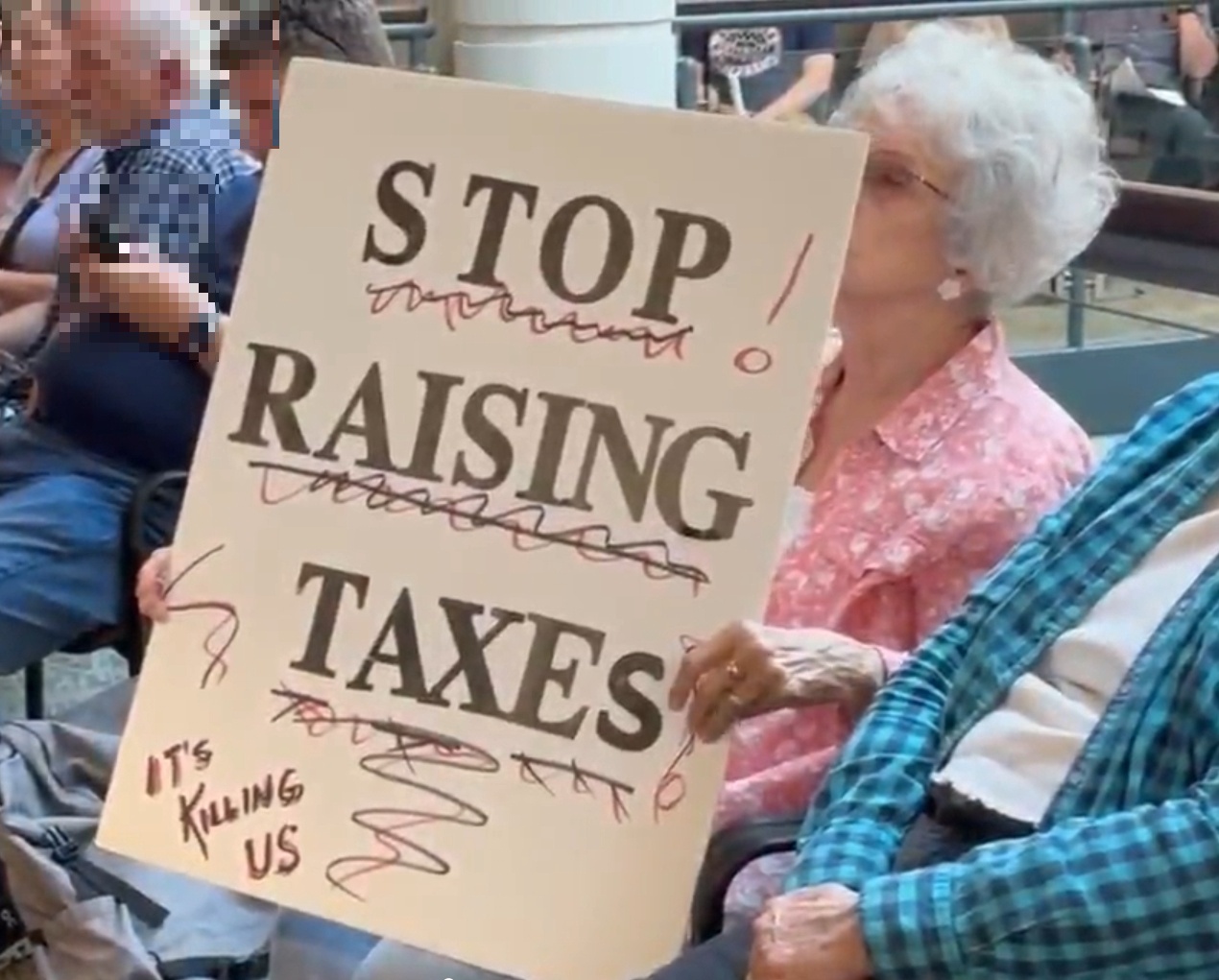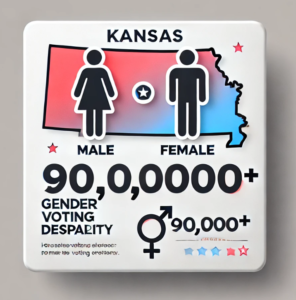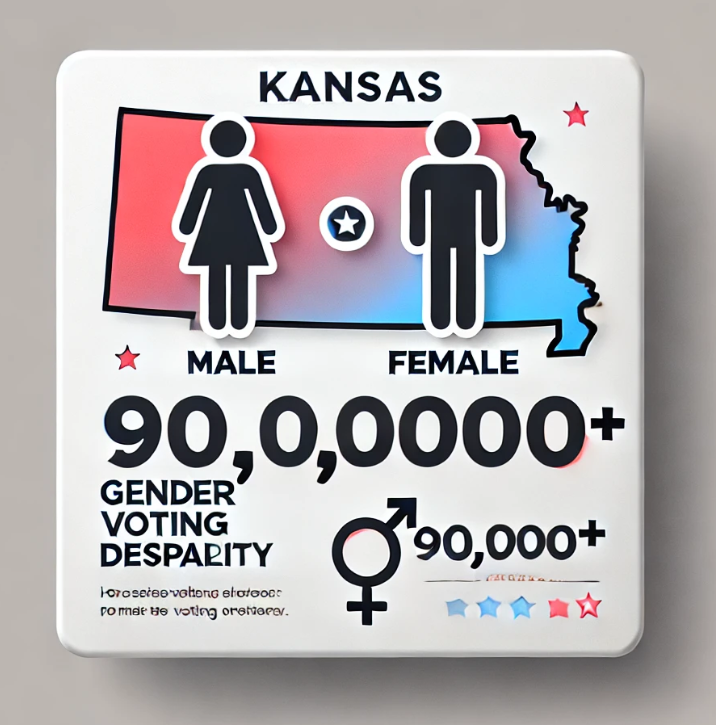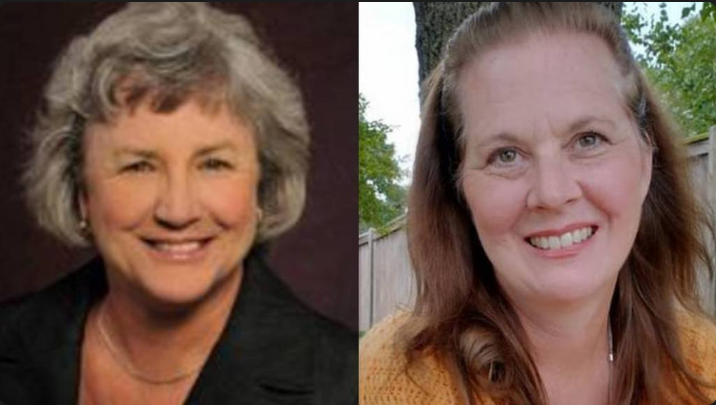A county commission that spends hundreds of thousands of dollars to create a homeless shelter without gauging the city’s support for it – while rejecting a motion to require its residents to be U.S. citizens?
A county commission that is still going all-in on divisive and discredited DEI ideology, as other entities across the nation increasingly abandon it?
A county commission that forbids public comments at its meetings from being seen and heard by the online public?
Is this Johnson County, Kansas – or Portland, Oregon?
“Well, I do believe that that’s the direction we’re heading, and that’s the choice that folks have in November,” says Johnson County District 3 Commissioner Charlotte O’Hara.
“Do you want Portland? Or do you want Johnson County to regain its senses and start acting like a Midwest conservative type of community?”
One of just two conservatives on the seven-member commission – in a historically red county – O’Hara is running for re-election Nov. 5, and is hoping not just that she wins but that two conservative challengers win other seats for a 4-to-3 majority, and the body’s liberal policies can be reversed.
Those other conservative candidates are Mark Hamill (District 2) and Mike Storm (District 6).
Job 1: Rein in taxes, spending
The first benefit of a conservative Johnson County Commission would be to rein in property taxes and county spending, O’Hara says.
“The first order of business would be to call for a forensic audit on the fact that about 80% of our 18,000 invoices did not have a purchase order – purchase orders were created [only] when the invoice was received – and as the internal auditor stated, no controls; we have no idea what we have.
“Unfortunately, that audit was ignored – put in the drawer – and nobody cares. And that type of attitude on a $1.818 billion budget, it’s just unacceptable. Putting our fiscal house in order, figuring out where we really are, that’s No. 1.”
Meanwhile, she says, as companies are cutting costs in the private sector, such as in mid-management, the county has hired a legislative liaison – despite the fact that it already has lobbyists in Topeka.
“There’s just no willingness to look at how we can save money without impacting services. None,” O’Hara laments. “We have a state lobbyist and a federal lobbyist. And now we have a legislative liaison. You talk about packing up the bureaucracy. It’s just unbelievable.”

Johnson County Commissioner Charlotte O’Hara
As for property taxes, “Between 1997 and 2023, property taxes for all local government entities except education in Johnson County increased by 357%; education property tax increased by 249%,” the Kansas Policy Institute reports, using Kansas Dept of Revenue data.
Property taxes are what O’Hara says voters are bringing up the most in her door-to-door campaigning.
“Oh, absolutely, absolutely. It’s becoming extremely painful for people to pay their property taxes, and we just can’t continue this trend.
“But if we keep the current makeup of the commission, or if I lose, it’s no longer going to be 5 to 2, it’s going to be 6 to 1, and the liberals will trump every, every attempt to try to get the financial house in order. They just simply won’t do it, because they believe everything’s fine.”
In a story headlined “Johnson County property owners share frustrations at budget meeting,” Fox4KC reported in August an upset audience at the county’s budget hearing “took up almost the entire third floor” of the county building. The station reported the budget raised taxes for the average property owner by at least 5%.
But the station reported that, while the majority of the audience were opposed to the budget, “Well, they don’t have the majority on the commission.”
Half a million out the door
Meanwhile, O’Hara notes the current Johnson County Commission recently spent a half-million dollars on very preliminary plans for a low-barrier homeless shelter in the city of Lenexa – without even having obtained the city’s approval for it.
And, indeed, the city council last month handily rejected a special use permit for the facility at I-35 and 95th Street on a 5-2 vote – after the nine-member Lenexa Planning Commission had unanimously recommended against it in August.
As a result, O’Hara says, $500,000 in taxpayer funds – including a $200,000 non-refundable earnest deposit on the land and as much as $300,000 on engineering and environmental studies – went out the county’s door with nothing to show for it.
“It didn’t just die; it went down in flames,” she says of the proposal. “And it just shows poor planning on the part of leadership. Obviously, the conversations weren’t really held with Lenexa, for the city council and the planning commission to come down that decisively on saying no to that project.”
Why wouldn’t the county have a better sense of whether the project would be approved before spending half a million dollars on it?
“Well, it’s because you have leadership that is virtue signaling,” O’Hara argues. “And they really, really think that it’s their way or the highway. This was a great rebuff to our chairman that, ‘No, we don’t want this.’
“And of course, there were shaming accusations of redlining, and all this. It has nothing to do with any of that. This is public safety – and a community standing up and saying we have the right to say no to a facility that does not fit within our comprehensive plan.”
The city, she says, has “put a lot of investment in that area to bring it up to be the front door that Lenexa wants. Lenexa has invested a lot of money in that area. New businesses have come in, businesses have made substantial investments – and the county just ignored all of that and said, ‘Nope, this is gonna be, because that’s what we want.’”
As it turns out, it wasn’t meant to be.
PAC money, liberal priorities
Asked about the three conservatives’ prospects Nov. 5, O’Hara says, “God’s will be done” – though she adds the race will undoubtedly involve a “pipeline of money” supporting her opponent, Julie Brewer – whom O’Hara alleges was “handpicked” by Commission Chairman Mike Kelly.
Kelly earlier this year formed the Amberwave Political Action Committee aimed at raising money for candidates “who will drive economic growth, expand sustainability efforts, and combat extremism.”
As an illustration of extremism, the Amberwave website features a photo from the state’s 2022 vote on whether abortion should be regulated by the Legislature.
Though races for county commission are ostensibly nonpartisan, Amberwave’s chair is Danielle Robinson, Democrat Rep. Sharice Davids’ former district director.
And although Robinson said in a press release that Amberwave is aimed at local races, records show it has accepted significant contributions from out of state, including Missouri and Washington, D.C.
The PAC’s contributors include:
- $10,000 from BlueStem fund, a 501c4 in Topeka that opposes school choice
- $10,000 from the Teamsters union in D.C. (DRIVE fund)
- $500 from Polsinelli, a left-leaning national law firm
- $2,500 from John Peterson, an attorney with Polsinelli that represents developers
- A number of developers and apartment complexes
Kelly also has installed two large committees, or “coalitions,” in county government zeroing in on liberal issues DEI (diversity, equity and inclusion) and sustainability. Citizens addressing the commission argued the committees were unnecessary and that appointments to them show “this body has become extremely partisan in practice.”
For her part, O’Hara also notes that each 15-member committee will sop up resources and staff time better used elsewhere.
“It’s virtue signaling on the part of the chairman, and it brings no value to the county,” she argues.











